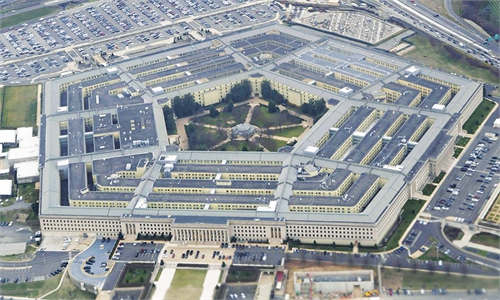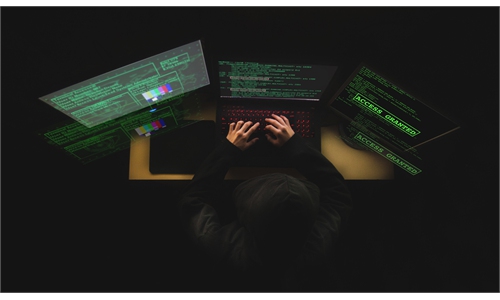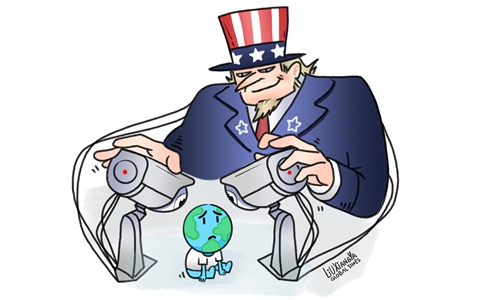Why is CIA openly discussing its misdeeds against China?: Global Times editorial

Photo: VCG
The information leaked by some former and current US intelligence officials to The Wall Street Journal (WSJ) has truly made people speechless. It is claimed that the CIA's spy network in China, which was "systematically rounded up" by Chinese counter-intelligence a decade ago, has been difficult to recover. The CIA claimed that it is currently struggling to rebuild the network. CIA Director William Burns revealed that the budget resources devoted to the China mission have more than doubled over the past three years.
As is well-known, the US has been engaging in large-scale, indiscriminate surveillance and espionage worldwide for a long time, earning itself the title of a veritable "surveillance empire." Such actions, which are essentially clandestine and go against international law and fundamental norms of international relations, cannot withstand public scrutiny. However, when Americans openly discuss these activities, there is no sense of shame or guilt. Instead, there is even a somewhat inexplicable sense of "justice," as if engaging in espionage is a privilege exclusively enjoyed by the US. This is not due to the "good psychological disposition" of the US but rather a manifestation of unbridled audacity and shamelessness that has developed after prolonged dominance - the ugly display of the "American exceptionalism" doctrine.
However, at the same time, this perplexing, lengthy article helps us understand why American political elites often fall into a kind of paranoid delusion, believing that China is constantly surveilling military bases across the US, eavesdropping on sensitive information, and stealing vital documents, among other things. Despite possessing the world's most formidable national strength, they exhibit a heightened sense of insecurity. If the outside world found it hard to understand this in the past, this WSJ article indicates that their fear ironically stems from their own actions.
The WSJ has exposed quite a bit this time. Firstly, it revealed the public proclamation by the CIA of engaging in espionage activities against China, possibly in an attempt to exaggerate its own value and seek increased budgetary support from Congress. However, this also amounts to self-incrimination. When the US hypes and targets alleged "Chinese spies," it consistently fails to provide concrete evidence. Instead, it initiates a smear campaign against China and subsequently demands China to prove its innocence. This pattern reveals that the US is fully aware of the lack of legitimacy in these "spy" allegations, yet shamelessly continues to clamor as if "no one can do anything about it." The US is always very self-confident for being "right," but its notion of "righteousness" differs fundamentally from the universally accepted definition.
Secondly, it proves that China's counter-espionage work is highly effective. It has dismantled the US spy network in China and prevented it from rebuilding for 10 years. This is a major achievement in counter-espionage, causing the US to stumble in the face of China's robust anti-espionage defense. When China revised its Counter-Espionage Law, it faced criticism from Western public opinion. Now it appears that the intention behind this criticism was to pressure China into removing its defenses and allowing their spies to operate freely within China's borders. Fortunately, China has not fallen into this trap. China has been able to defend against espionage in the past, and will also have the ability to render CIA infiltration useless in the future.
Thirdly, it reminds us that the string of counter-espionage must be tightened. The CIA has indicated that rebuilding its spy network in China is currently their main focus and will continue to be so for the foreseeable future. In 2021, there were reports that the CIA established a mission center for China, the only single-country mission center at the agency. All of this may make the situation of China's counter-espionage more complex and severe. It is important to emphasize that the fight against espionage does not conflict with China's high-level opening-up to the outside world, and normal foreign exchanges will not be disturbed or affected. Tightening the string of counter-espionage does not mean suspecting every foreigner as a spy just because of their nationality.
This year, Chinese singer Dao Lang released a highly popular song called "Luocha Haishi," which has been played over 10 billion times, breaking the Guinness World Record. The "Luocha Kingdom" in the song is inspired by Strange Tales from a Chinese Studio, a collection of Classical Chinese stories by Qing dynasty writer Pu Songling, in which ugliness is portrayed as beauty and black and white are confused. Many Chinese netizens have noticed that this "Luocha Kingdom" is very similar to today's US in many aspects. The WSJ article vividly depicts the CIA's portrayal of ugliness as beauty and the confusion of black and white. The mainstream perception of the international community cannot be distorted. After the illegal surveillance by the US on its allies such as South Korea, Japan, and Germany was exposed, these countries ultimately chose to swallow insult and humiliation silently, but China cannot do the same.



